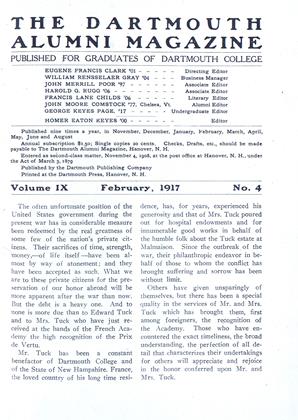"Friends of France" published by Houghton Mifflin & Company, a book dealing with the field service of the American Ambulance and described by its members has one chapter, "Christmas Eve 1915" by Waldo Pierce which deals largely with Richard Nelville Hall '15 and his untimely death. The book contains two photographs of Hall taken at the front and one of his grave. The following passages from the book may be of interest at this time.
"All this time, as in all the past months, Richard Nelville Hall calmly drove his car up the winding, shellswept artery of the mountain of war,— past crazed mules, broken-down artillery carts, swearing drivers, stricken horses, wounded stragglers still able to hobble,—past long convoys of Boche prisoners, silent, descending in twos, guarded by a handful of men,—past all the personnel of war, great and small (for there is but one road, one road on which to travel, one road for the enemy to shell),— past abris, bombproofs, subterranean huts, to arrive at the postesde sec ours, where silent men moved mysteriously in the mist under the great trees, where the cars were loaded with an ever-ready supply of still more quiet figures (though some made sounds), mere bundles in blankets. Hall saw to it that those quiet bundles were carefully and rapidly installed,—right side up, for instance,—for it is dark and the brancardiers are dull folks, deadened by the dead they carry; then rolled down into the valley below, where little towns bear stolidly their daily burden of shells wantonly thrown from somewhere in Bocheland over the mountain to somewhere in France—the bleeding bodies in the car. a mere corpuscle in the full crimson stream, the ever-rolling tide from the trenches to the hospital, of the blood of life and the blood of death. Once there, his wounded unloaded, Dick Hall filled his gasoline tank and calmly rolled again on his way. Two of his comrades had been wounded the day before, but Dick Hall never faltered. He slept where and when he could, in his car, at the poste, on the floor of our temporary kitchen at Moosch—dry blankets—wet blankets—blankets of mud—blankets of blood; contagion was pedantry—microbes a myth.
"At midnight Christmas Eve, he left the valley to get his load of wounded for the last time. Alone, ahead of him, two hours of lonely driving up the mountain. Perhaps he was thinking of other Christmas Eves, perhaps of his distant home, and of those who were thinking of him.
"Matter, the next American to pass, found him by the roadside halfway up the mountain. His face was calm and his hands still in position to grasp the wheel. Matter, and Jennings, who came a little latter, bore him tenderly back in Matter's car to Moosch, where his brother, Louis Hall, learned what had happened.
"A shell had struck his car and killed him instantly, painlessly. A chance shell in a thousand had struck him at his post, in the morning of his youth.
"Up on the mountain fog was hanging over Hartmann's Christmas morning, as if Heaven wished certain things obscured The trees were sodden with dripping rain. Weather, sight, sound, and smell did their all to sicken mankind, when news was brought to us that Dick Hall had fallen on the Field of Honor. No man said, "Merry Christmas," that day. No man could have mouthed it. With the fog forever closing in, with the mountain shaken by a double bombardment as never before, we sat all day in the little log hut by the stove thinking first of Dick Hall, then of Louis Hall, his brother, down in the valley.. .....
"Gentlemen at home, you who tremble with concern at overrun putts, who bristle at your partner's play at auction, who grow hoarse at football games, know that among you was one who played for greater goals—the lives of other men. There in the small hours of Christmas morning, where mountain fought mountain, on that hard-bitten pass under the pines of the Vosgian steeps, there fell a very modest and valiant gentleman."
 View Full Issue
View Full Issue
More From This Issue
-
 Article
ArticleTHE SCHOOL AND COLLEGE LIFE OF JUDAH DANA OF THE CLASS OF 1795
February 1917 By James A. Spalding '66 -
 Books
BooksThe New Reservation of Time
February 1917 By HENRY T. MOORE -
 Class Notes
Class NotesCLASS OF 1916
February 1917 By Richard Parkhurst -
 Article
ArticleTRUSTEE EDWARD K. HALL TO LEAVE NEW ENGLAND
February 1917 -
 Article
ArticleThe often unfortunate position of the United States government
February 1917 -
 Class Notes
Class NotesCHICAGO ASSOCIATION
February 1917 By T.T. REDINGTON '07, CHARLES R. WEBSTER '82, CHANCELLOR L. JENKS '861 more ...
Article
-
 Article
ArticleTUCK AND THAYER POSITIONS
May, 1909 -
 Article
ArticleBRONZE BUST OF EMERSON PRESENTED TO THE COLLEGE
February 1916 -
 Article
ArticleWith the D.O.C
August 1942 -
 Article
ArticleClass Reunions
May 1946 -
 Article
ArticleTime Marches Back
March 1941 By John B. Stearns. -
 Article
ArticleTHE CHRISTIAN ASSOCIATION IN WAR TIME
December 1918 By Ralph J. Richardson '09


